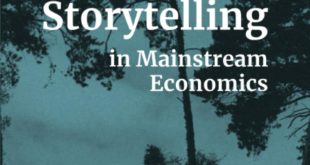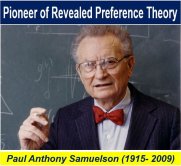Nationalekonomi som vetenskap har världen över förlorat otroligt mycket i prestige och status under senare år. Inte minst på grund av dess oförmåga att analysera och förklara ekonomiska och finansiella kriser och på grund av dess avsaknad av konstruktiva och hållbara förslag på att ta oss ur dessa kriser. Hur återskapar vi förtroendet för nationalekonomin? Fem förändringar är helt avgörande. (1) Sluta låtsas som om vi har exakta och riktiga svar på allting. För det har vi...
Read More »Economics textbooks transmogrifying truth
Economics textbooks transmogrifying truth Perfect competition idealizes the very small firm, its growth constrained by rising AVC [Average Variable Cost] as it expands output. But why does AVC rise? And why does it rise to such an extent that it outweighs declining AFC [Average Fixed Cost], resulting in the U-shaped cost curve? Current textbooks do not supply an explanation. For example, N. Gregory Mankiw, in his Principles of Microeconomics, simply states...
Read More »My new book is out
My new book is out Contemporary mainstream economics — still — focuses on studying what happens in abstract and unrealistic models. A deeper study of underlying causal mechanisms in the economy could make economic science more realistic. However, when faced with the monumental gap between empirical data and models, mainstream economists often resort to one of their four favourite strategies to immunize the models against facts: 1. Treat the model as an...
Read More »Woke presentism
.[embedded content]
Read More »‘Covering law’ explanations in economics
‘Covering law’ explanations in economics As a philosopher of science, it is interesting to note that many economists and other social scientists appeal to a requirement that explanations, in order to be considered scientific, must be capable of “reducing an individual case to a general law.” As a fundamental principle, a general law is often invoked in the form of “if A, then B,” and if one can demonstrate in individual cases that if A and B are present,...
Read More »The torch has to be carried on
The torch has to be carried on I was on a one year sabbatical leave at Cambridge University, King’s College by invitation of Professor Wynne Godley in the year 1988/89. Seriously speaking I was surprised, because except for Godley there were only few economists left at the Faculty, who called him-/herself Keynesian. The old guard of Keynes’ disciples had disappeared: Joan Robinson and Nicholas Kaldor were no longer alive; Richard Kahn very fragile....
Read More »Big Data ‘solutions’ to poverty
Big Data ‘solutions’ to poverty Chetty’s pitch to the nation is that our problems have technocratic solutions, but at times I sense that he is avoiding an argument … Poor people would be better off if their children had better prospects, but also if they had more money—if the fruits of our society were shared more broadly. “I can take money from you and give it to me, and maybe that is good and maybe it is not,” he said. “I feel like there are a lot of...
Read More »Mästarnas mästare
Zlatan i all ära, men för mig kommer alltid den här grabben att vara nummer ett.Bosse Larsson spelade 16 säsonger i MFF. Han vann sex SM-guld och toppade skytteligan vid tre tillfällen. 1965 gjorde han 28 mål på 22 matcher. Denne legendar är — precis som yours truly — uppvuxen på Rosendalsvägen på Backarna i Malmö …
Read More »Revealed preference theory — much fuss about nothing
Revealed preference theory — much fuss about nothing Thirty years ago yours truly wrote an article on revealed preference theory that got published in History of Political Economy (no. 25, 1993). Paul Samuelson wrote a kind letter and informed me that he was the one who had recommended it for publication. But although he liked it a lot, he also wrote a comment — published in the same volume of HOPE — saying: Between 1938 and 1947, and since then as Pålsson...
Read More »How to do econometrics properly
How to do econometrics properly Always, but always, plot your data. Remember that data quality is at least as important as data quantity. Always ask yourself, “Do these results make economic/common sense”? Check whether your “statistically significant” results are also “numerically/economically significant”. Be sure that you know exactly what assumptions are used/needed to obtain the results relating to the properties of any estimator or test that you...
Read More » Lars P. Syll
Lars P. Syll








